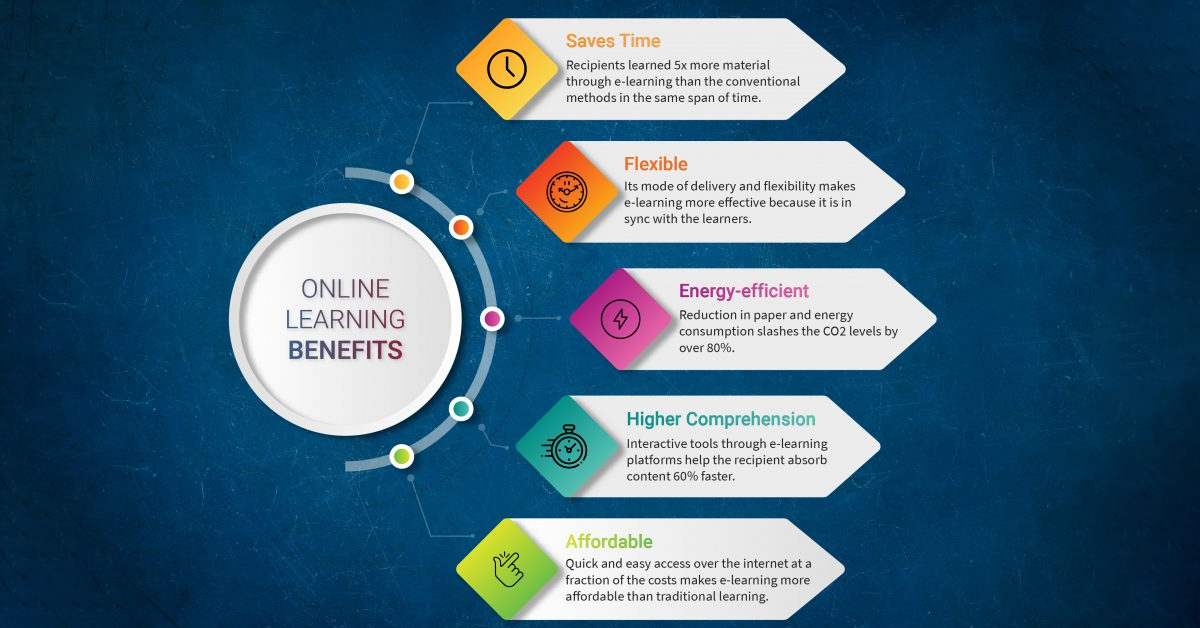Discover the 20 Game-Changing Advantages of E-Learning Platforms and Online Education
A significant change is occurring in the dynamic environment of education. Geographic barriers are vanishing as online learning takes on a crucial and central role, virtual lectures are replacing conventional classroom setups, physical textbooks are undergoing a digital
transformation, and virtual lectures are replacing virtual lectures. The development of e-learning platforms has extended the reach of education outside the actual boundaries of institutions by offering a flexible and adaptable approach that can be tailored to the various needs of today’s learners.
The needs of modern, active learners are being met by modifications to traditional teaching methods. Because of the availability of e-learning platforms, online education is now a versatile and efficient substitute for conventional classroom instruction.
Flexibility and Comfort
In the realm of online learning, you hold the reins to structure your learning timetable in alignment with your commitments. Online courses grant you access to lectures and study materials at your convenience, whether you’re a working professional, a parent, or an individual with a bustling schedule. This adaptability ensures that your educational voyage seamlessly integrates with your other responsibilities.
Individual-Paced Learning
The concept of self-paced learning is introduced through e-learning platforms, offering students the autonomy to grasp concepts thoroughly before progressing. This approach adjusts to diverse learning paces, guaranteeing that every student comprehends the material. Learners have the option to revisit challenging topics, allocate additional time to subjects that intrigue them, and advance when they feel adequately prepared.
Universal Education
The accessibility of online education is among its most outstanding benefits. Geographical restrictions are no longer a barrier, giving students from distant regions or countries with few educational opportunities the chance to enroll in top-notch programs and get access to professional guidance, wherever they may be in the world.
Customized Learning
E-learning platforms use data and algorithms to tailor content to the specific learning needs and preferences of each user. Every student will have a unique educational experience thanks to this adaptive learning strategy, which also increases engagement and helps students understand the material more thoroughly.
Numerous Course Options
Nearly every imaginable subject is covered by the vast selection of online courses. The choice of courses that resonate with learners spans academic disciplines and professional skills.
Global Learning Opportunities
Online courses connect learners with instructors and peers from around the world. This exposure to diverse perspectives enriches discussions, enhances critical thinking, and promotes cross-cultural understanding, preparing students for a globalized world.
Cost-Effective Education
Online courses are often more affordable than traditional in-person education. There are no commuting costs, accommodation expenses, or expensive textbooks. This cost-effectiveness makes quality education attainable for individuals who might otherwise be limited by financial constraints.
Continuous Lifelong Learning
Online learning encourages the idea of lifelong learning. Whether you’re looking to upskill in your current career or explore new interests post-retirement, online courses offer the flexibility to keep learning and growing, regardless of your age or stage in life.
Interactive Online Classes
Many e-learning platforms facilitate interactive learning experiences through live sessions, discussion forums, and collaborative projects. This engagement not only fosters a sense of community but also enhances comprehension through active participation.
Learning Management Systems (LMS)
E-learning platforms often utilize robust Learning Management Systems (LMS) that centralize course materials, assignments, and communication channels. This organization streamlines the learning process, making it easy for students to navigate and track their progress.
Remote Learning Benefits
Online learning is especially advantageous during unforeseen circumstances that require remote education. Natural disasters, health crises, or personal commitments no longer disrupt your education, as you can continue learning from the safety of your home.
Technological Learning Advantages
Engaging with online platforms and tools enhances learners’ technological literacy. In a digital age, these skills are essential for effective communication, problem-solving, and success in various professions.
Virtual Education
Virtual classrooms immerse learners in interactive environments, enabling them to explore simulations, virtual reality experiences, and multimedia content. This hands-on approach to learning enhances comprehension and retention.
Time Management Skills
Online learning demands effective time management skills. Meeting deadlines, creating schedules, and juggling coursework alongside other responsibilities develop a valuable life skill that extends beyond education.
No Geographic Barriers
Online education erases geographical boundaries, making education accessible to anyone with an internet connection. This accessibility is especially beneficial for those in rural or underserved areas.
Digital Literacy Skills
Navigating online platforms, researching, and utilizing digital resources enhance learners’ digital literacy. These skills are indispensable in today’s digitally-driven society.
Improved Digital Communication
Online courses promote communication through written forums, chats, and emails. This cultivates clear and effective written communication skills, essential in both academic and professional contexts.
Benefits of Online Education
Thanks to the many advantages of online learning, your academic experience can be improved and your career options can be increased. Online courses offer a distinctive educational experience by combining flexible scheduling, a variety of subject options, and individualised support.
Global Skill Enhancement
One major benefit of online education is its ability to improve your skill set from anywhere in the world. By using this strategy, you can fill knowledge gaps without deviating from your regular commitments or routines.
Enrolling in an Online Course
Developing your career allows you to learn new things and earn respectable credentials.
Conclusion
The numerous advantages offered by online learning and e-learning platforms highlight the transformative potential of digital learning. The broad adoption of technology has had a significant impact on daily life, including education. Online learning improves convenience, flexibility, and accessibility, giving students more control over their academic goals. Just two benefits among many include the development of critical thinking abilities and the provision of individualised learning experiences.
Frequently Asked Questions (FAQs)
Q1.Is in-person instruction more effective than online instruction?
A1: Online education can be equally as effective as traditional methods, if not more so. This is because interactive tools, flexible scheduling options, and opportunities for personalized learning are available.
Q2.Do employers value degrees earned online?
A2: Many reputable institutions and organizations offer online courses, and employers frequently take these credentials seriously. The professional development of this recognition.
Q3.How can I stay motivated while taking online courses?
A3: Setting goals, creating a study routine, taking part in online discussions, and asking for advice from peers and instructors are all ways to maintain motivation while learning online.
Q4. Do students interact with instructors during online coursework?
A4.Yes, instructors and students can communicate in the majority of online courses.
Q5.Are there options for financial aid for online courses?
A5.The availability of online resources, programs, and platforms that offer financial aid, scholarships, and payment plans has made education more accessible.
Q6.How do I decide which online course is best for me?
A6: Think about your interests, goals, the reputation of the provider, the course syllabus, and reviews before selecting an online course.








